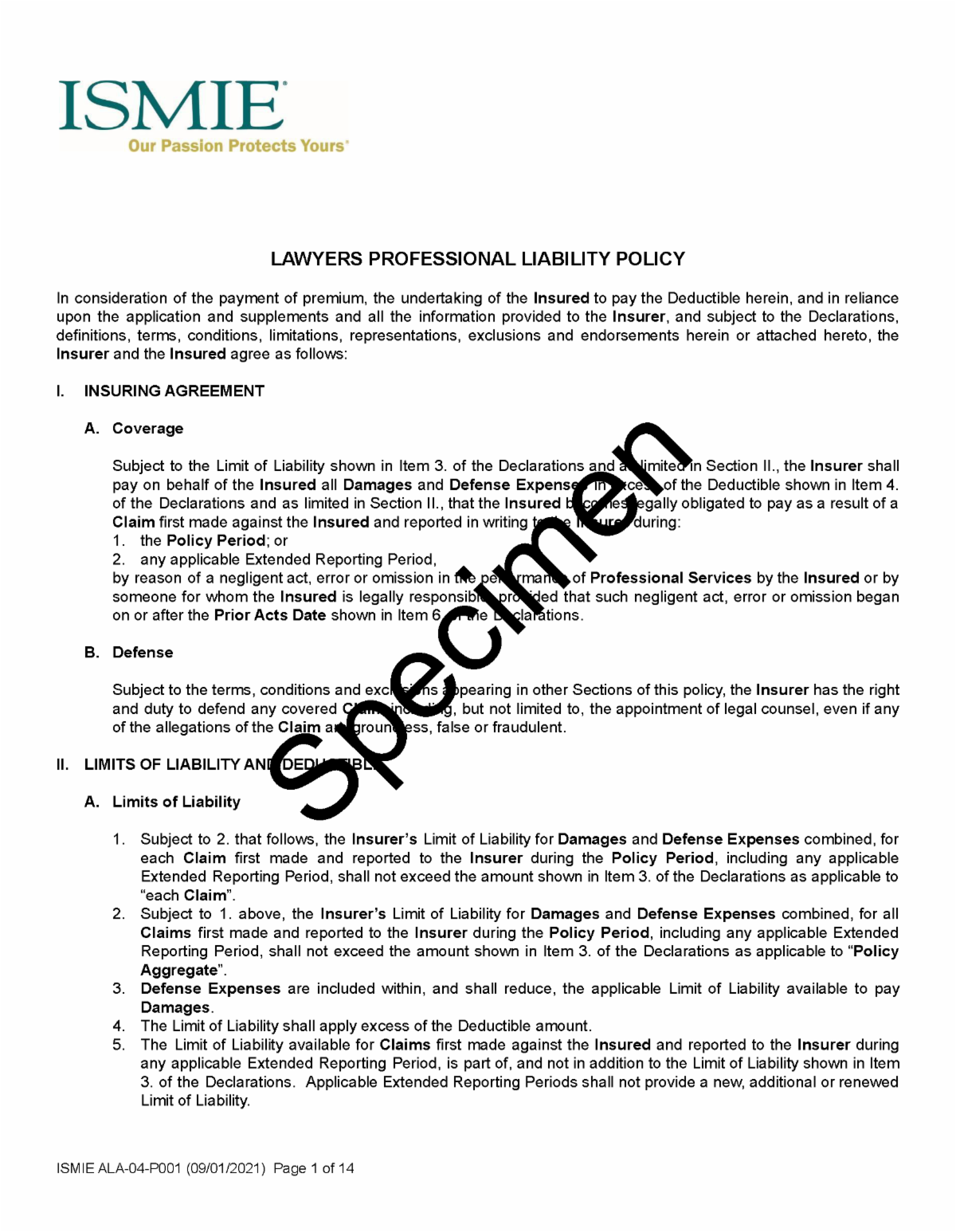
Attorney Malpractice Insurance Policies are claims-made and reported policies. When the coverage ends the ability to report claims for past acts ends at policy termination. Attorneys leaving private practice via retirement, becoming a judge or working in the private or public sector need to protect their past acts. Insurers will not renew attorney malpractice policies for attorneys that are no longer in private practice. Given this it is important for attorneys to protect their past acts once coverage ends. For solo practitioners and small firms that may close once the practitioner leaves, the nonpracticing Extended Reporting Period Endorsement/Retirement Tail (ERP) may be an answer.
Note: For attorneys closing or leaving their small firm to work at another law firm the nonpracticing Extended Reporting Period Endorsement/Retirement Tail (ERP) is not an option. Coverage for their past acts is outside of the scope of this blog.
Each insurer’s policy differs on requirements and wording for obtaining this valuable ERP endorsement at no or reduced cost. Careful planning by the attorney may save the attorney thousands of dollars. The ability to request an ERP differs by insurer but is time sensitive. Regardless of the insurer, the attorney must completely stop private practice to obtain the nonpracticing ERP.
The ISMIE policy provides a nonpracticing ERP based on the following policy language:
III. EXTENSIONS OF COVERAGE
3. Non-Practicing Extended Reporting Period
(a) Eligibility
If an Insured completely retires from or otherwise ceases the private practice of law during the Policy Period, such Insured shall have the option to purchase an unlimited period of time during which Claims may be reported to the Insurer pursuant to Section VI., General Condition A.1., Notice of Claim.
Coverage under any such extension of time to report a Claim (referred to below as the Non-Practicing Extended Reporting Period) shall apply solely to negligent acts, errors or omissions in rendering Professional Services:
(1) committed or attempted prior to the date of such Insured’s retirement or termination of private practice; and
(2) which are not otherwise excluded by any terms, conditions or exclusions of this policy.
The option to purchase a Non-Practicing Extended Reporting Period will apply only to such Insured as an individual lawyer and will not apply to any other lawyer, including but not limited to any lawyer acting as an independent contractor or contracting on a per diem basis.
(b) Non-Practicing Extended Reporting Period Premium and Deductible
Any specific Non-Practicing Extended Reporting Period must be elected by the Named Insured. For each Non-Practicing Extended Reporting Period elected, the additional premium charged will be 300% of the individual lawyer Insured’s proportionate share of the annual policy premium.
The Insurer will waive the premium for a respective Non-Practicing Extended Reporting Period if such individual lawyer Insured:
(1) dies, except by suicide;
(2) becomes Totally and Permanently Disabled; or
(3) retires or otherwise ceases the private practice of law during the Policy Period and has been insured by the Insurer under a primary Lawyers Professional Liability Policy continuously for the last three years.
The Deductible amount and Deductible provisions of this policy do not apply to Claims first made against such individual lawyer Insured during any Non-Practicing Extended Reporting Period.
If the Non-Practicing Extended Reporting Period requested by the Named Insured is issued by the Insurer, the additional premium, if any, shall be fully earned by the Insurer and the Non-Practicing Extended Reporting Period cannot be cancelled by the Insureds or the Insurer.
(c) Non-Practicing Extended Reporting Period Limits of Liability
The Insurer’s Limit of Liability for all Claims first made against an Insured during any Non-Practicing Extended Reporting Period will be part of, and not in addition to, the Limit of Liability shown in Item 3. of the Declarations, regardless of the number of Non-Practicing Extended Reporting Periods purchased.
If the Non-Practicing Extended Reporting Period herein applies to a Claim, Section VI.H., Other Insurance, shall not apply to such Claim. If any other policy of insurance in effect would apply to any Claim first made against an Insured during the Non-Practicing Extended Reporting Period, then coverage provided under this policy during any Non-Practicing Extended Reporting Period shall not apply. Such other insurance shall render this Non-Practicing Extended Reporting Period inapplicable, even though the limit of liability of such other insurance may be inadequate to pay all Damages and Defense Expenses or the Deductible amount and retention provisions of such other insurance may be different from those of this policy.
4. Conditions for Extended Reporting Periods
As a condition precedent to the right to elect an Extended Reporting Period:
(a) all premium and Deductible amounts due under this policy must have been paid;
(b) all Insureds must be in compliance with the terms and conditions of the policy;
(c) the Named Insured’s right to practice law has not been revoked, suspended or surrendered at the request of any regulatory authority for reasons other than death, disability or retirement; and
(d) the Named Insured provides the Insurer with written notice of its selection and pays the premium charge, if applicable, for the selected Extended Reporting Period in full within 60 days of the expiration date of the Policy Period.
This right to elect an Extended Reporting Period shall lapse unless the provisions of (a) through (d) in the preceding paragraph are fully met.
IV. DEFINITIONS
I. Insured means the Named Insured, Predecessor Firm, and:
1. any present or future principal, partner, director, officer, member or employee of the Named Insured;
2. any former principal, partner, director, officer, member or employee of the Named Insured or of a Predecessor Firm;
3. the estate, heirs, executors, administrators, assigns and legal representatives of an Insured but only in the event of such Insured’s death, incapacity, insolvency or bankruptcy, and only to the extent that such Insured would otherwise have been provided coverage under the terms, conditions and exclusions of this policy;
4. any contract or temporary employee of a Named Insured under the direct supervision of an Insured; and
5. any lawyer acting as “of counsel”;
but only with respect to Professional Services performed within the scope of their duties on behalf of the Named Insured or Predecessor Firm.
K. Named Insured means the entity, individual, partnership or corporation shown in Item 1. of the Declarations.
S. Totally and Permanently Disabled means that the Insured is so disabled as to be wholly prevented from rendering Professional Services provided that such disability is reasonably expected to be continuous and permanent, and:
1. has existed continuously for not less than six months; or
2. the Insurer is provided with written proof of the Insured’s total and permanent disability, including the date the disability commenced, certified by a physician acceptable to the Insurer.
Switching insurers near retirement to save a few dollars may cost an insured attorney thousands of dollars to buy the same protection. Planning retirement or a transition out of private practice should be discussed with your malpractice insurance agent prior to ending private practice when possible.
CLICK HERE TO OBTAIN AN ATTORNEY MALPRACTICE QUOTE

Lee Norcross, MBA, CPCU
(616) 940-1101 Ext. 7080